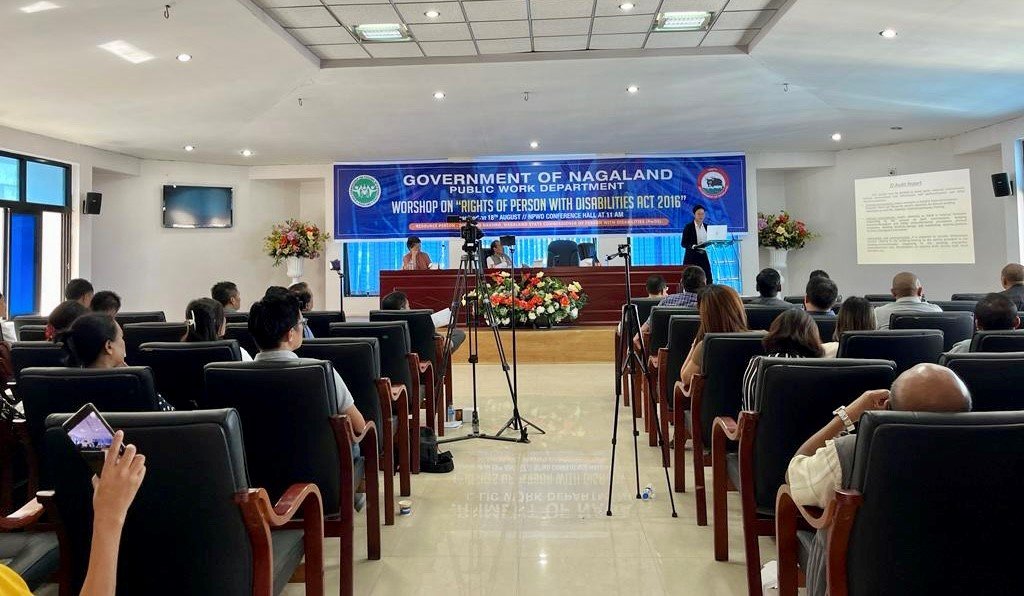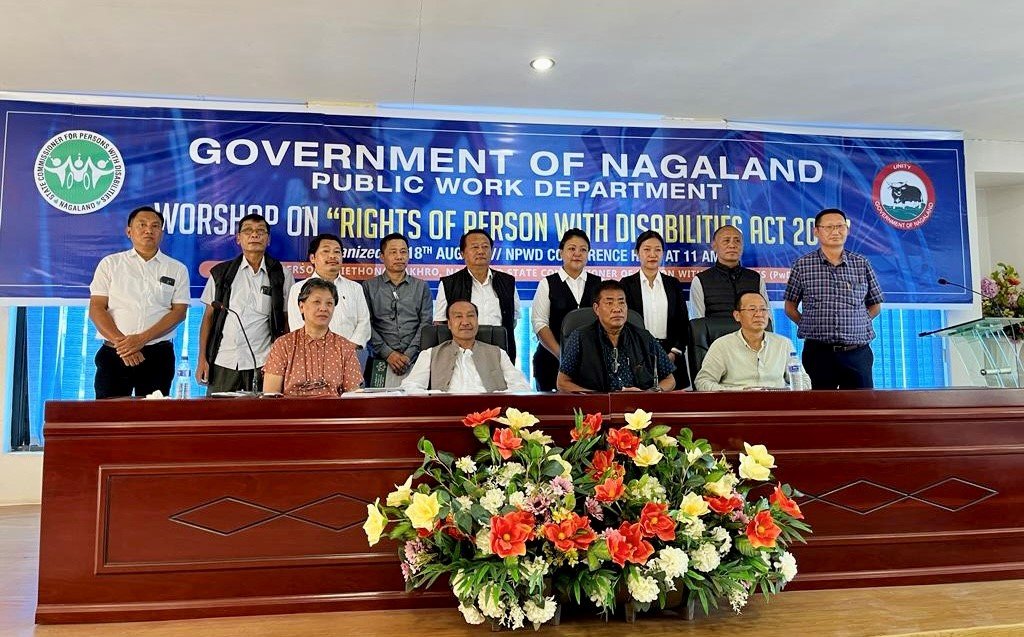A workshop on Rights of Persons with Disabilities Act 2016 and Universal Accessibility for engineers and officials of the Public Work Department (PWD) (Housing) was held on 18 August 2023 at Nagaland Public Work Department (NPWD) Conference Hall, Kohima. Diethono Nakhro, Nagaland State Commissioner for Persons with Disabilities (SCPD) was a resource person at the workshop.
Speaking at the program, Nakhro said that accessibility is when the needs of people with disabilities are specifically considered, and products, services, and facilities are built or modified so that they can be used by people of all abilities.
“It is a sad reflection of our society that all our new public buildings and spaces are having to go through retrofitting processes to make them accessible when they should have been necessarily designed and planned inclusively for all citizens right from the start,” she said.
In fact, she said, none of these new buildings should have been given NOC or certification of completion for occupation until and unless they were in compliance with all the accessibility requirements.
“It is completely unacceptable that virtually all our government and public buildings and spaces are still inaccessible, and we continue to disgracefully build inaccessible buildings and structures in violation of all existing disability laws,” she lamented.
Download Nagaland Tribune app on Google Play

She said that RPwD Act 2016 highlighted the relevant sections pertaining to accessibility of the built environment.
Nakhro referred Section 40 that “The Central Government shall, in consultation with the Chief Commissioner, formulate rules for persons with disabilities laying down the standards of accessibility for the physical environment, transportation, information and communications, including appropriate technologies and systems, and other facilities and services provided to the public in urban and rural areas.”
She said that the section 40 talks about standards of accessibility. The Harmonised Guidelines & Standards for Universal Accessibility in India 2021 has already been published by the Ministry of Housing & Urban Affairs, Nakhro added.
Section 44 stated that no establishment shall be granted permission to build any structure if the building plan does not adhere to the rules formulated by the Central Government under section 40.
“This means that all building plans should necessarily comply with all accessibility features mentioned in the Harmonised Guidelines before they get permission to start building – ramps, lifts, accessible toilets, accessible doorways and corridors, barrier-free floor plans, tactile tiles and signages and so on,” the SCPD said.
No construction should be allowed to start unless the building plans, blue prints include all basic accessibility features, she said.
Section 44 also stated that no establishment shall be issued a certificate of completion or allowed to take occupation of a building unless it has adhered to the rules formulated by the Central Government.
‘Completed’ buildings cannot be handed over for occupation until and unless all accessibility provisions are all completed and functioning, she said adding that the concerned department must prepare an accessibility checklist, which must all be fully completed before a certificate of completion/handing over document can be given to the concerned department for occupation.
“I have seen in many of the new buildings that various accessibility components are left incomplete and we are told that it will be completed or installed at a later date – example, lifts, accessible toilets, etc,” Nakhro said.
This practice must be stopped immediately, she said and insisted that the buildings must be fully completed with all accessibility provisions before occupation.
She also referred Section 45, which says, “All existing public buildings shall be made accessible in accordance with the rules formulated by the Central Government within a period not exceeding five years from the date of notification of such rules. All existing public buildings in the state must be listed and made accessible in accordance with laid down accessibility rules within a given period of time.
Department must maintain accessibility data of all government and public buildings
“Laws and rules are well and good and can be executed to a certain degree. But it is the empathy, the proper understanding of the need of people who live with disabilities that will actually bring about the change that we require in our landscape of buildings and structures,” she said.
Stating that accessibility is not optional, Nakhro said, “It is not an accessory. It is not there for decoration. It is an absolute requirement.”
She said that lack of accessibility means people who live with disabilities basically have no life.
“That is not right. That is depriving them of their human right as an equal citizen,” the SCPD said adding that accessibility is a fundamental human right and non-negotiable.
Talking on universal accessibility, she said that accessibility is not optional, adding that “It is a fundamental human right and non-negotiable.”
She said that no construction of any public building/structure can be started if the building plans are not fully compliant with all basic accessibility standards for built environments.
Completed building cannot be handed over for occupation until and unless all accessibility provisions are all completed and functioning, Nakhro said.
She said that all existing public buildings in the state must be listed and made accessible in accordance with laid down accessibility rules within a given period of time.
The department must maintain accessibility data of all government and public buildings, the commissioner added.

Khriesinuo Kire and Asenla Walling, both legal consultant of State Commissioner for Persons with Disabilities, Nagaland talked on “Harmonized guidelines and standards for Universal Accessibility in India 2021” which was previously known as the Harmonised Guidelines and Space Standards for Barrier-Free Built Environment for Persons with Disabilities and Elderly Persons, 2016.
Earlier, the guidelines were for creating a barrier-free environment, but now, the focus is on Universal Accessibility, said Kire.
The guideline was issued under Section 15 of the Rights of Persons with Disabilities Rules, 2017, as a mandatory document to be implemented for all public building which simply means all built environment open to public (both govt. establishments and private establishments).
Walling also said that all built environment should be assessed and evaluated for accessibility in three broad domains, i.e, Information systems, infrastructure systems and building management systems.
She said the guideline need to be adopted across all build environment practices of all scales from master planning to building interiors and services.
The guidelines are mandatory for both Government establishment and Private establishment.
The guideline advocate and strongly recommend all built environments to enhance accessibility levels in each building whether existing or new or orient the infrastructure building practices towards universal accessibility, Walling said.
Kire said that with context to state of Nagaland and the Rights of Persons with Disabilities Act, 2016, though the notifications were issued, there are hardly any departments who have implemented it “which only goes to show that the Act is not taken seriously for reason best known to them.”
Some changes are seen now a day with lift facilities in public buildings. However, most of the time, it remains non-functional.
Further, the doors to the lifts are mostly too small that it cannot accommodate a wheelchair user, for which given the priority, the lifts were built for, she said.
“It is ironic to state that there are still officers in high-ranking chairs who feels that there is no point in adding lift facilities in the Office buildings as there are no employees who are dependent on wheelchairs or walkers, etc. Such is the mentality of our current state,” Kire said.
It is essential that the Rights of Persons with Disabilities Act, 2016, along with the various National Policies and Schemes be strictly adhered and implemented in consonance with the Harmonized Guidelines & Standard Universal Accessibility, 2021, she said.
“The duty and responsibility lie solely upon the stakeholders- you and me, to take these initial stages in building our society, our State into a Universal Accessible Environment, where not only the persons with disabilities but also the senior citizens along with other vulnerable groups can move around freely, independently and be at par with the populace,” Kire added.
The programme was chaired by Er. Hozheto Shikhu, Chief Engineer, PWD (Housing) while welcome address was delivered by Er. Pukroneizo Kera, Engineer-in-Chief, NPWD.
Vote of thanks was proposed by Temsu Soyah, Senior Legal Advisor, NPWD.

